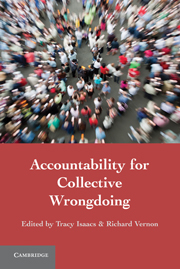Book contents
- Frontmatter
- Contents
- List of Contributors
- Acknowledgments
- Introduction
- PART I COLLECTIVE ACCOUNTABILITY IN INTERNATIONAL LAW
- 1 Collective Responsibility and Postconflict Justice
- 2 State Criminality and the Ambition of International Criminal Law
- 3 Punishing Genocide: A Critical Reading of the International Court of Justice
- 4 Joint Criminal Enterprise, the Nuremberg Precedent, and the Concept of “Grotian Moment”
- 5 Collective Responsibility and Transnational Corporate Conduct
- 6 Collective Punishment and Mass Confinement
- PART II DISTRIBUTING ACCOUNTABILITY
- Index
- References
4 - Joint Criminal Enterprise, the Nuremberg Precedent, and the Concept of “Grotian Moment”
Published online by Cambridge University Press: 05 June 2012
- Frontmatter
- Contents
- List of Contributors
- Acknowledgments
- Introduction
- PART I COLLECTIVE ACCOUNTABILITY IN INTERNATIONAL LAW
- 1 Collective Responsibility and Postconflict Justice
- 2 State Criminality and the Ambition of International Criminal Law
- 3 Punishing Genocide: A Critical Reading of the International Court of Justice
- 4 Joint Criminal Enterprise, the Nuremberg Precedent, and the Concept of “Grotian Moment”
- 5 Collective Responsibility and Transnational Corporate Conduct
- 6 Collective Punishment and Mass Confinement
- PART II DISTRIBUTING ACCOUNTABILITY
- Index
- References
Summary
During a sabbatical in the fall of 2008, I had the unique experience of serving as special assistant to the international prosecutor of the Extraordinary Chambers in the Courts of Cambodia (ECCC), the tribunal created by the United Nations and the government of Cambodia to prosecute the former leaders of the Khmer Rouge for the atrocities committed during its reign of terror (1975–79). During the time I spent in Phnom Penh, my most important assignment was to draft the prosecutor's brief in reply to the Defense Motion to Exclude “joint criminal enterprise” (JCE), and in particular the extended form of JCE known as JCE III, as a mode of liability from the trial of the five surviving leaders of the Khmer Rouge.
JCE III is a form of liability somewhat similar to the Anglo-American “felony murder rule” in which a person who willingly participates in a criminal enterprise can be held criminally responsible for the reasonably foreseeable acts of other members of the criminal enterprise even if those acts were not part of the plan. Although few countries around the world apply principles of coperpetration similar to the felony murder rule or JCE III, since the decision of the Appeals Chamber of the International Criminal Tribunal for the Former Yugoslavia (ICTY) in the 1998 Tadić case, it has been accepted that JCE III is a mode of liability applicable to international criminal trials.
- Type
- Chapter
- Information
- Accountability for Collective Wrongdoing , pp. 119 - 139Publisher: Cambridge University PressPrint publication year: 2011

